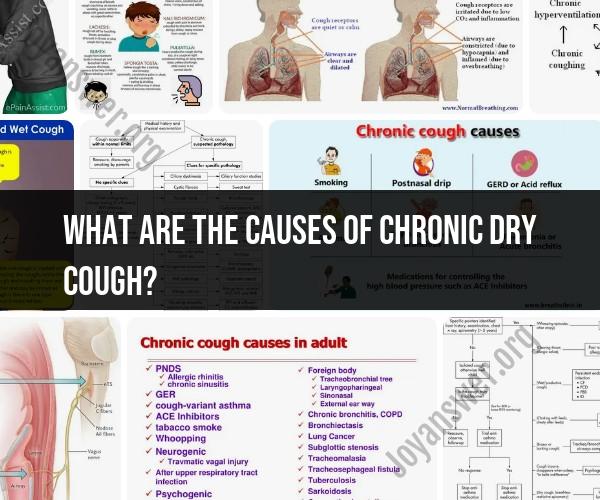What are the causes of chronic dry cough?
Postnasal Drip: This occurs when mucus from the nasal passages drips down the back of the throat, irritating it and causing a cough. It can be triggered by allergies, sinusitis, or a respiratory infection.
Gastroesophageal Reflux Disease (GERD): Acid reflux can lead to irritation of the throat, which in turn causes a chronic cough. It's often referred to as "acid reflux cough."
Asthma: Chronic cough can be a symptom of asthma, especially if it is worse at night or triggered by exercise, allergens, or cold air.
Chronic Bronchitis: Inflammation of the bronchial tubes can lead to a persistent cough. Smoking is a common cause of chronic bronchitis.
Medications: Certain medications, such as ACE inhibitors (used to treat high blood pressure), can cause a chronic dry cough as a side effect.
Environmental Irritants: Exposure to smoke, dust, pollutants, or other irritants can lead to chronic coughing, especially in those with underlying sensitivity or conditions like chronic obstructive pulmonary disease (COPD).
Respiratory Infections: Infections such as bronchitis, pneumonia, or tuberculosis can cause a cough that lingers after the infection has cleared.
Occupational Exposures: Some occupations involve exposure to harmful chemicals or irritants that can lead to chronic coughing, known as occupational cough.
Allergies: Allergic reactions to pollen, pet dander, mold, or other allergens can cause a persistent dry cough.
Interstitial Lung Disease: This group of lung disorders can lead to scarring of the lung tissue and persistent coughing.
Neurological Conditions: Certain neurological conditions, like neuropathy or psychogenic cough, can cause chronic coughing.
Heart Conditions: Heart failure can lead to fluid buildup in the lungs (pulmonary edema), causing coughing.
ACE Inhibitors: Some medications used to treat high blood pressure, known as ACE inhibitors, can cause a chronic cough as a side effect.
Psychogenic Cough: In some cases, coughing may be psychological, where there is no physical cause, but rather a habitual or psychological response.
A chronic dry cough can have various underlying causes, and it's important to consult a healthcare professional for a proper diagnosis and treatment. Some common causes of persistent dry cough include:
If you or someone you know is experiencing a persistent dry cough, it's essential to seek medical attention. A healthcare provider can perform a thorough evaluation, which may include medical history, physical examination, and potentially imaging or other diagnostic tests, to determine the underlying cause and recommend appropriate treatment or management strategies.
Chronic Dry Cough: Root Causes and Potential Triggers
A chronic dry cough is a cough that lasts for more than eight weeks and does not produce phlegm. It can be caused by a variety of factors, including:
- Postnasal drip: This is the most common cause of chronic dry cough. It occurs when mucus from the nose drains down the back of the throat. Postnasal drip can be caused by allergies, colds, the flu, or other respiratory infections.
- Asthma: Asthma is a chronic lung condition that causes inflammation and narrowing of the airways. This can lead to a variety of symptoms, including wheezing, shortness of breath, and coughing. A chronic dry cough is a common symptom of asthma, especially in children.
- Gastroesophageal reflux disease (GERD): GERD is a condition in which stomach acid backs up into the esophagus. This can irritate the throat and cause a dry cough.
- Medications: Some medications, such as ACE inhibitors for high blood pressure, can cause a dry cough as a side effect.
- Other medical conditions: A chronic dry cough can also be a symptom of other medical conditions, such as chronic obstructive pulmonary disease (COPD), bronchiectasis, and lung cancer.
Persistently Dry Throat: Unraveling the Causes of Chronic Cough
In addition to the root causes listed above, there are a number of potential triggers that can worsen a chronic dry cough. These triggers include:
- Irritants in the air: Smoke, dust, pollen, and other irritants in the air can trigger a dry cough.
- Cold weather: Cold weather can dry out the airways and make them more sensitive to irritants.
- Exercise: Exercise can sometimes trigger a dry cough, especially in people with asthma or allergies.
- Talking or singing: Talking or singing can irritate the throat and trigger a dry cough.
- Certain foods and drinks: Some foods and drinks, such as caffeine, alcohol, and spicy foods, can irritate the throat and trigger a dry cough.
When Coughing Won't Quit: Investigating Chronic Dry Cough
If you have a chronic dry cough, it is important to see a doctor to rule out any underlying medical conditions. Your doctor will ask about your symptoms and medical history, and may perform a physical examination. They may also order tests such as a chest X-ray or pulmonary function tests.
Once the cause of your cough has been identified, your doctor can recommend the appropriate treatment. Treatment may involve medications, lifestyle changes, or a combination of both.
Here are some tips for managing a chronic dry cough:
- Avoid triggers. If you know what triggers your cough, try to avoid those things. For example, if you are allergic to pollen, stay indoors on days when the pollen count is high.
- Stay hydrated. Drinking plenty of fluids can help to thin mucus and keep your throat moist.
- Use a humidifier. A humidifier can add moisture to the air, which can help to relieve a dry cough.
- Take over-the-counter medications. Over-the-counter cough syrups and lozenges can help to soothe a sore throat and reduce coughing.
- See a doctor. If your cough is severe or does not improve with home treatment, see a doctor. They may prescribe stronger medications or other treatments.












